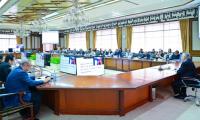ISLAMABAD: The government has no immediate plan to re-promulgate the vital lapsed amendments to the National Accountability Bureau (NAB) law that it had introduced in December last through an ordinance to instill confidence in bureaucrats to freely take decisions instead of sitting on files.
“Revival of these amendments is not on the table,” a cabinet member, who is one of the key legal minds of Prime Minister Imran Khan, told The News on condition of anonymity.
At present, he said, the focus of the government is on getting different pieces of legislation stuck up in the Parliament since long passed without further delay. He said this process will start after the budget session would be over. Since the National Assembly and the Senate were not summoned due to the COVID-19 pandemic, these amendments remained unattended.
The ordinance, which expired five weeks back, was issued in end-December having the usual 120-day constitutional life. Since it was not approved by the Parliament, it expired after four months. The government would have extended it for another 120 days through a resolution in the National Assembly, but the Lower House of Parliament could not be convened.
The prime minister had decided to promulgate the ordinance after receiving several complaints that the bureaucracy has become dysfunctional due to the fear of the NAB. He had publicly expressed the view after issuing the ordinance that officials would now be free to take decisions for which they would not be asked questions by the NAB.
The ordinance stated that currently the NAB is dealing with a large number of inquiries and investigations in addition to handling mega corruption cases. Under the existing regime a number of inquiries have been initiated against the public officeholders and government servants on account of procedural lapses where no actual corruption is involved. This has enhanced NAB's burden and has also affected working of the federal government. While assuming parallel jurisdiction, the NAB is also inquiring into matters pertaining to taxation, imposition of levies etc., and is, therefore, interfering in the domain of taxation regulatory bodies. An act done in good faith and in discharge of duties and performance of official function will not constitute an office unless there is corroborative evidence of accumulation of any monetary benefit or asset which is disproportionate to the known sources of income or which cannot be reasonably accounted for, the government stated.
These amendments had taken out of the NAB’s purview the decisions taken by bureaucrats and public officeholders that entailed no monetary gain, swelling their assets disproportionate to their known sources of income. The ordinance provided that no action will be taken against them unless it is shown that they materially benefited by gaining any asset or monetary benefit which is inconsistent with their known sources of income and that there is evidence to corroborate such material benefit.
Another key feature of the changes was that trials pertaining to federal or provincial taxation, levies or imports stand transferred from the accountability courts to the criminal courts, which deal with offences under the respective laws relating to these matters.
Former speaker and prominent leader of the Pakistan Muslim League-Nawaz (PML-N) Sardar Ayaz Sadiq told The News that the opposition parties would have come out with their joint response to the expired ordinance had it been brought before them in the Parliament. However, the opposition particularly the Pakistan People’s Party (PPP) was favourably disposed to these amendments and might not have opposed them in the Parliament.
“We want the package of amendments proposed by the opposition parties in the National Accountability Ordinance, 1999 should be discussed and the draconian law be reformed,” Ayaz Sadiq said. “Since the government is reluctant to talk about our proposals, it is shy of bringing its own amendments in the NAB law in the legislature.”
College administration is required to appear in person to explain the details of the incident and any actions taken to...
Court observed that the TCP termed it a “shortage”, whereas the Punjab trading agency claims that a substantial...
Anti-Terrorism Special Court Judge Malik Ijaz Asif also announced 32 years in jail and a fine of Rs0.5 million for the...
Two-day conference at the King Abdullah Campus of UAJK aims to chart a course towards sustainable economic growth and...
In Hub, environmental sample was collected on April 17, 2024 from the ‘Jumma Khan Bazar Pul’ environmental sample...
President highlighted that Pakistan was committed to regional connectivity, and the Central Asian countries needed to...






